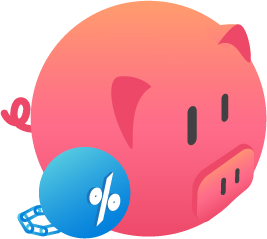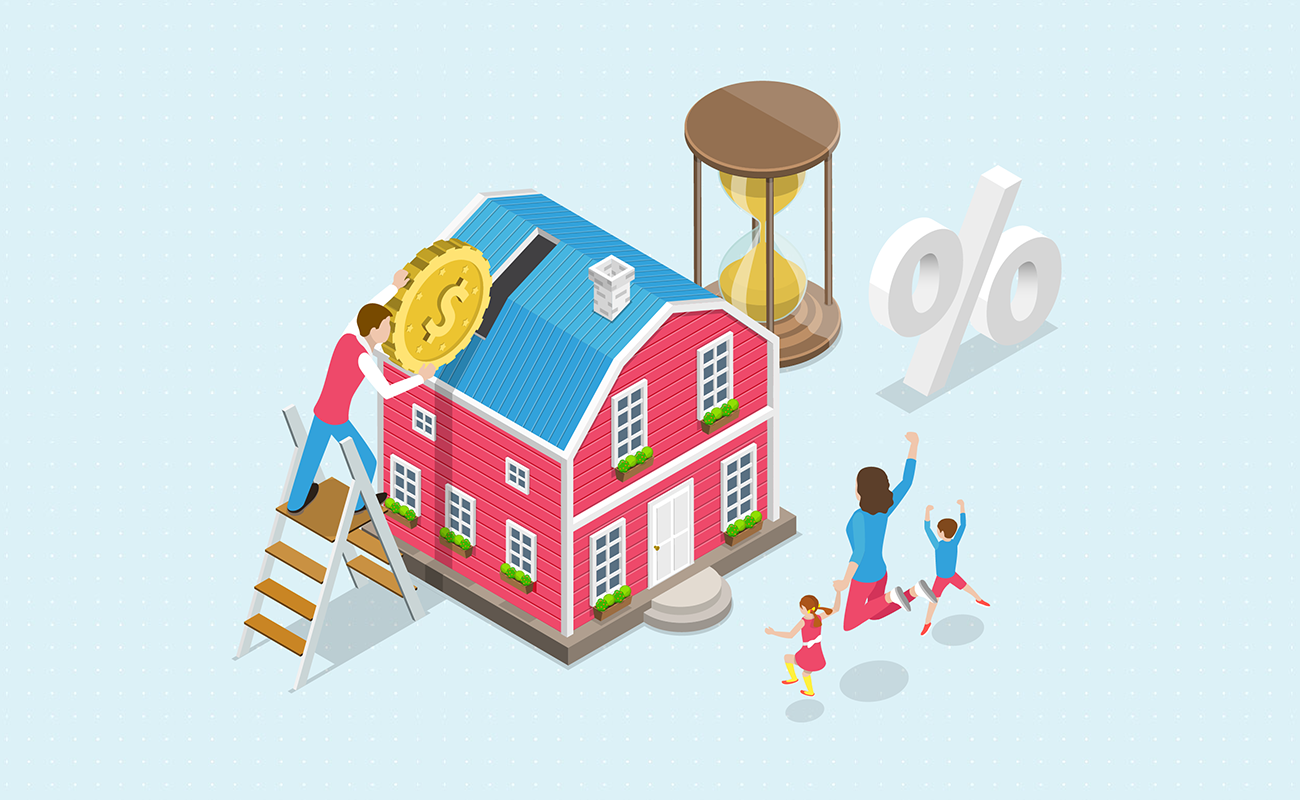Debt Investment
 Debt Investment Calculator
Debt Investment CalculatorUse this calculator to figure out how much interest you can save by adding an extra sum to your regular debt payments.
Guide published by Jose Abuyuan on January 23, 2020
While investing in the stock market can be an appealing way to build wealth, consumers with high-interest debt are almost certainly going to outperform market returns by paying extra on their debts to pay off their debts faster.
When one pays off their debts they are guaranteed future returns by not paying further interest on the debt which no longer exists. Further, saving money you would have spent on interest goes untaxed and there is no market volatility in consistently saving money & paying down debt.
Taking out a loan is a critical financial move. It allows you to make major life purchases, such as your first car or dream home. At the same time, this decision urges you to manage your finances more conscientiously.
While loans allow you to obtain important needs, they usually take several years to pay off. For others, paying them down may even take decades.
What if you can be debt-free sooner? The truth is, there are numerous benefits to actively paying your loans faster. In this article, we will rundown the many outsized returns of debt investment and how it helps secure your future.

Think of your interest savings when you pay loans faster.

Carrying large debts lock down a huge percentage of your income. You might not notice it now, but you lose a lot of money on interest charges the longer your debt goes unpaid. If you pay off your balance sooner, you’ll have more of your salary to save.
For example, let’s say you have a 30-year fixed-rate mortgage with a $250,000 loan amount at 4 percent interest. Every month, this gobbles up around $1,193.54 of your salary. That’s $14,322.48 for an entire year. If you calculate the overall interest cost throughout the life of your loan, you end up spending $179,673.77.
To counteract this loss, you can make extra payments to save in interest costs. It will also shave years off your loan term.
The table below shows how much you can save on interest by paying $150 more each month. It also indicates how many years you can stave off your mortgage term.
Loan amount: $250,000
Annual interest rate: 4%
| Details | Original | New | Difference |
|---|---|---|---|
| Payment | $1,193.54 | $1,343.54 | $150 more |
| No. of Payments | 360 | 291 | Less 69 payments |
| Pay off date | Jan 2050 | April 2044 | Less 6 years |
| Interest paid | $179,673.77 | $140,914.22 | Total interest savings: $38,759.30 |
By adding $150 each month to your payment, you remove 6 years off your loan term. Instead of 30 years, you can pay down your mortgage in 24 years. Out of 360 payments, you save 69 payments off your loan. Finally, instead of paying $179,673.77 in overall interest, you pay $140,914.22. This saves you $38,759.30 in overall interest cost.
If you use our calculator, the results will also indicate the following results:
This savings translates into a guaranteed, tax-free, average annual return of 4.00%. And that’s not even considering the emotional returns you’ll get when you pay off this debt 69-payments ahead of schedule! Your debt will be paid off April 2044 instead of the originally scheduled January 2050.
Committing to extra payments will considerably reduce your loan balance and payment time.
How do you do this? You can arrange fixed monthly payments with your bank. They can install an auto debit feature to your account during payment dates. Another strategy is to talk to your lender and arrange payments directly to your principal. Make sure to track your payment schedule and contact your lender to verify your additional payments are being applied.
Apart from mortgages, you can also apply extra payments to your auto loans, credit card debt, and almost any type of loan to increase your returns. For long-term mortgages, people may also refinance their home loan to a lower rate and shorter term.

Take note, however, that some lenders may impose a penalty fee for early debt payment. Make sure to ask your bank about their early pay off terms before arranging added payments.
Being debt-free means having significantly more income that can go towards savings. Once you’ve eliminated your debt, you can open an emergency fund or save for your child’s college tuition. You can even invest your money in other worthwhile personal goals.

Once you save more income, you can start investing in your retirement fund.
Money that goes toward your savings account is not taxable. However, any interest earned on your savings is taxed. The Internal Revenue Service (IRS) regards any interest-generating financial instrument to be a type of investment for tax purposes.
But this rule has an exception, specifically if you have a savings account titled under an individual retirement account (IRA) or any tax-deferred retirement account. Interest on these types of savings do not require you to report them.
When does your saving account get taxed? The IRS may tax your savings account if the interest earned is exceeds $10. It is taxed at the marginal rate, which means a greater average tax rate is imposed if you are a higher income individual.
Again, take note that only interest on your savings account is taxed, not the balance. How does this affect your money? For instance, if you have $15,000 in your savings account that earns 0.2% interest, you will only be taxed $30 based on the interest. The tax is not applicable to the principal that raised your earnings.
Basically, money you earn now is income taxed. But setting up a retirement fund helps ensure most of your savings won’t get deducted.
Making timely payments and reducing your debt helps increase your credit score. With good credit history, lenders will see you as an attractive and creditworthy borrower. This will work in your favor if you plan on taking a loan in the future.
Credit bureaus look into the amount you borrow in relation to the maximum amount you are allowed to borrow. This is known as your credit utilization ratio, which encompasses 30 percent of your credit score.
Credit utilization is a percentage that indicates whether you are about to max out your credit card. If you keep it low, ideally under 30 percent of your limit, it should not negatively affect your credit score. This also gives you more borrowing capacity in case you really need extra cash.
Apart from credit utilization, credit bureaus also check your debt to income ratio. This is calculated by getting all your loan payments and dividing them by your gross monthly income. Lenders use this to estimate your ability to repay the money you need to borrow.
Being in debt takes you one step closer to all kinds of disastrous situations. For instance, if you have a medical emergency, you might incur thousands of dollars of debt. By then, It would be a struggle to pay it off.
This may trigger a chain reaction. Once you miss loan payments, it will reduce your credit score. You’ll be hounded by aggressive debt collection agencies. Some lenders may even threaten to sue you for non-payment. And if you can’t keep up your mortgage payments, you risk losing your home to foreclosure.
You can avoid all these problems if you reduce your debt and pay them sooner. Eventually, it will give your finances extra wiggle room to accommodate emergency situations.

Finally becoming debt-free is highly rewarding. Apart from gaining financial security, paying down debt helps reduce stress. It significantly lessens anxiety and worry, which can rob people of a good night’s sleep.
A study by Northwestern University showed that people report 12 percent higher stress levels when they have large debt. This research included 8,400 young respondents from ages 24 to 32 years old.
Apart from the emotional stress, worrying about debt can also hinder cognitive function. Research published in Frontiers in Psychology found that people who experience poverty and deep debt had impaired attention spans.
Making that decision to start paying your debts does great wonders for your finances. Imagine how much better it will be for your emotional and psychological health.
Take this time to assess your financial situation. Does your current lifestyle help support the future you want? How can you make changes that will go towards removing your debts?
If you cannot do this, later on, you might struggle with years of loan payments. This will eat away your life’s savings, along with your dream of a comfortable retirement. More importantly, you should consider how this can affect your family in the long-term.
Moving forward, keep track of the debts you owe. Start prioritizing loan payments so you can eliminate loan balances one by one. And if you’re planning on taking a new loan, make sure to negotiate for lower interest rates.
Don’t wait until you’re old and still making payments to wipe out debt. The sooner you pay your loans, the earlier you can set aside money for your retirement.
Need help figuring out how your loan payments are calculated? To know how much goes to your principal and interest, visit this page.
Jose Abuyuan is a web content writer, fictionist, and digital artist hailing from Las Piñas City. He is a graduate of Communication and Media Studies at San Beda College Alabang, who took his internship in the weekly news magazine the Philippines Graphic. He has authored works professionally for over a decade.